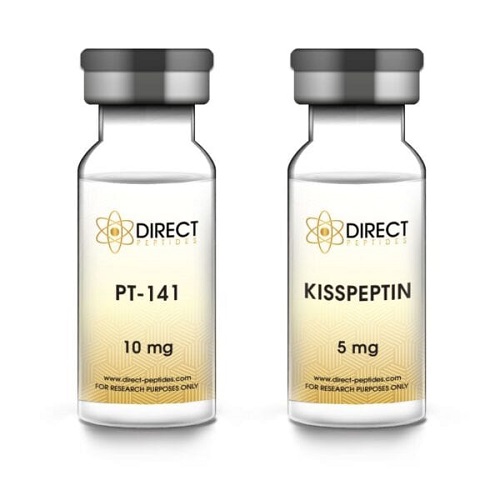
If your lab’s been searching for a molecular key to unlock the secrets of fertility, puberty, and hormone regulation—Kisspeptin might just be your front-runner.
Discovered in the most charmingly ironic way (named after Hershey, PA—the birthplace of the chocolate “kiss”), Kisspeptin isn’t sweet in taste but is undeniably powerful in function. At Direct Peptides, we’re excited to bring this fascinating peptide to the forefront of research, offering potential breakthroughs in reproductive health and hormonal balance.
What Is Kisspeptin, Really?
Kisspeptin is a naturally occurring peptide encoded by the KISS1 gene, and it operates as a powerful activator of the hypothalamic-pituitary-gonadal (HPG) axis—that central command station for reproductive function.
Here’s the simplified sequence:
Kisspeptin → GnRH release → LH & FSH secretion → Fertility, puberty, and hormonal balance.
Whether it’s ovulation, sperm production, or the delicate hormonal choreography that defines reproductive health, Kisspeptin leads the dance.
And, for those looking to optimize their sexual wellness, the Kisspeptin Nasal Stack for Sexual Wellness has emerged as an intriguing solution to harness Kisspeptin’s powerful effects on the body.
More than that, research now suggests Kisspeptin also has influence over emotional behavior, metabolism, cardiovascular health, and even cancer pathways.
Kisspeptin Mechanism of Action: How It Works
At its core, Kisspeptin binds to the KISS1R receptor (also called GPR54). This binding sparks a chain reaction in the brain:
-
Stimulates GnRH neurons in the hypothalamus.
-
Causes pulsatile release of GnRH.
-
Signals the pituitary gland to release LH and FSH.
-
These, in turn, regulate sex hormone production and gamete development.
Think of it like flipping the main breaker in a hormonal circuit box—everything lights up.
But its influence doesn’t stop at the glands. Studies show it also affects brain regions responsible for mood, sexual behavior, and motivation, expanding its research potential beyond reproduction.
Molecular Details (For the Biochemically Inclined)
-
Sequence: H-Tyr-Asn-Trp-Asn-Ser-Phe-Gly-Leu-Arg-Phe-NH₂
-
Molecular Formula: C₆₃H₈₃N₁₇O₁₄
-
Molecular Weight: 1302.4 g/mol
-
PubChem CID: 25240297
What Are the Research Benefits of Kisspeptin?
Regulation of Reproductive Hormones
Kisspeptin is the ignition switch for the HPG axis. Without it, puberty stalls and fertility falters. Mutations in its receptor have been linked directly to hypogonadotropic hypogonadism—a condition where sexual development and hormone production are disrupted.
Testosterone-Boosting Potential
By triggering LH secretion, Kisspeptin encourages natural testosterone production in the testes. That’s a game-changer in treating conditions like hypogonadism and even in PCT (post-cycle therapy) for athletes and patients transitioning off exogenous testosterone.
Improves Fertility Outcomes
Kisspeptin has shown excellent results in IVF procedures, offering a safer alternative to traditional hormonal triggers. It can stimulate oocyte maturation without risking ovarian hyperstimulation.
Initiates Puberty
Studies reveal rising Kisspeptin levels precede puberty. Its interaction with growth hormone (GH) makes it a target for treating both precocious and delayed puberty.
Fun fact from the lab: One researcher joked that Kisspeptin doesn’t just launch puberty—it sends it express mail.
Influences Mood and Behavior
Kisspeptin stimulates brain regions involved in emotion and sexual response. Studies show increased brain activity in subjects receiving the peptide—suggesting potential therapeutic applications in mood disorders.
PCOS Treatment Potential
PCOS patients often have altered Kisspeptin signaling. Research indicates correcting this could restore ovulatory cycles and help manage symptoms.
Neuroendocrine Research Tool
Because it acts on GnRH neurons, Kisspeptin is pivotal for understanding the brain-endocrine connection—especially in diseases where hormone feedback loops are disrupted.
Supports Cardiovascular Health
Emerging studies hint that Kisspeptin may play a role in regulating blood pressure and vascular health, making it a candidate for cardiovascular research.
Kidney Function Insights
Yes, even the kidneys get involved. Kisspeptin appears to impact filtration, angiogenesis, and electrolyte balance, opening new paths in treating chronic kidney disease and hypertension.
Metabolism and Energy Balance
Initial data suggests Kisspeptin may influence appetite regulation, body weight, and interaction with hormones like leptin and insulin—a possible ally in the fight against obesity and metabolic disorders.
Cancer Research Applications
Originally identified as a metastasis suppressor, Kisspeptin can limit tumor cell migration and invasion, particularly in breast and prostate cancers. It's an exciting prospect for anti-metastatic therapies.
Kisspeptin Product Options
Kisspeptin Peptide Vial – 10mg
-
Form: Lyophilized powder
-
Use: Requires reconstitution with bacteriostatic water
-
Application: Ideal for precise dosing in lab-based hormone and fertility studies
Kisspeptin + PT-141 Nasal Stack
-
Form: Intranasal spray
-
Use: Combines Kisspeptin with PT-141 (Bremelanotide), a peptide known for enhancing libido and sexual arousal
-
Benefit: Non-invasive, fast-absorbing, and synergistically formulated for sexual health research
